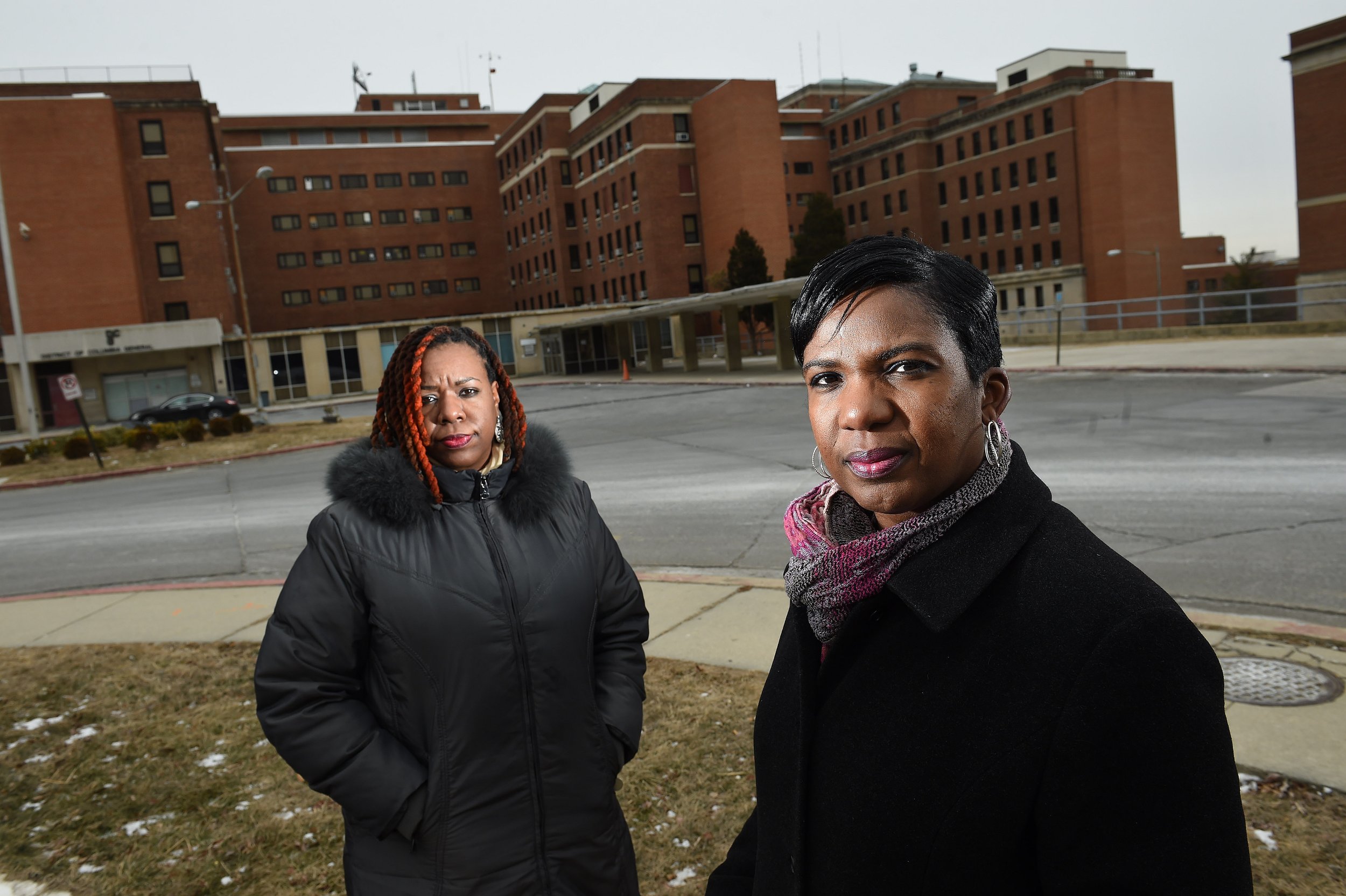Black, Brown, Indigenous and Missing
Derrica Wilson (left) and Natalie Wilson (right) outside of DC General shelter in February 2015 in Washington, D.C. They started the Black and Missing Foundation, Inc. [Matt McClain/Getty Images]
When Gabby Petito, a 22-year-old travel blogger, was reported missing last month, the internet banded together to find her. TikTok videos boosted her story. Novice gumshoes pored over social media accounts. People who encountered Petito and her fiancé, Brian Laundrie, during their travels came forward with information.
The attention lavished on Petito’s tragic case was a reminder that it is mostly cases of abducted white women that provoke media frenzies over missing people. Meanwhile, the cases of missing Black, brown and Indigenous people don’t go viral, and their families are often left to do the difficult work themselves.
“We can call out Chandra Levy, Laci Peterson, Natalee Holloway, Gabby Petito, but how many people know Deidre Reid, Keeshae Jacobs, Akia Eggleston?” asks Derrica Wilson, the co-founder of the nonprofit Black and Missing Foundation. “No one knows those names and we have to change that narrative.”
Founded in 2008, the Black and Missing Foundation helps families of color get help from law enforcement and the media when loved ones go missing. In an interview with AJ+ producer Iliana Hagenah, Wilson noted that “[the lack of media exposure] tells us that our lives are not valued and that we don't matter, and that they're not willing to look for us,” and explained what the media, police and community members can do to change.
“First and foremost, my heart goes out to Gabby Petito’s family. No family should ever have to experience this. But there's a lot of ‘Gabby Petitos’ in the minority community,” Wilson said.
This interview has been edited for length and clarity.
Why did you decide to co-found this organization?
The inspiration behind the organization was a young lady by the name of Tamika Huston. She went missing from my hometown of Spartanburg, South Carolina. And despite the fact that her aunt was a media professional, her family struggled to garner local coverage, much less national. Months later, Natalee Holloway disappeared. Of course, she is a household name.
When we started the organization, 30 percent of missing persons in the United States were persons of color. That number has since increased to 40 percent. We know the numbers are much higher because, when you look at the FBI breakdown, the Hispanic and the white races are actually joined together, giving the appearance that there are more missing white people than there are any other race.
What work has your organization done since?
We've helped reunite and bring closure to over 400 families. There's no media obsession over our Black and missing, and so we have to create our own outlet to get our stories out there with the overall hope of someone coming forward to reunite these families or bring closure.
We want to provide our community with the skills, knowledge and tools to protect themselves. We want to encourage families to have these uncomfortable conversations. We want parents to monitor what their children are doing online and teach them about internet safety. We teach self-defense classes, and then we partner with media outlets to share the stories.
Why is there so much public outrage over Gabby Petito versus the people that you advocate for?
There's this phrase often used: “missing white woman syndrome.” Unless you're fairly attractive, young, blonde hair, blue eyes, your cases are just not sensational enough.
These families that we advocate for are getting the door slammed in their face at every turn. They go and report their loved ones to law enforcement. When it’s a child, they’re classified as runaways – runaways are not receiving an Amber Alert, and there's no sense of urgency. Missing adults, their disappearance is associated with some sort of criminal activity. It really dehumanizes the fact that this is someone’s [loved one]. And so we are just trying to change that narrative. Like, all lives matter and all cases need to be handled with care and empathy.
We understand that not every case is going to bubble up to national media, but name one Black or brown person. Just one. It's impossible. You can't. … No missing person of color has ever received that type of uproar in mainstream media. [That media coverage] brings on additional resources. So all the coverage that Gabby’s case received brought on the FBI, local police jurisdictions, groups with the cadaver dogs, drones. The minority community, we can't simply get a flyer or a police report to have posted on the social media platforms of news outlets or police departments.
What can the media do better?
When these families turn to the television, especially right now, their local and national news outlets are covering [Gabby’s] case, but yet they're sitting here asking themselves, “Why is my family member devalued?” We would love for there to be more diversity in the newsroom. The decision-makers don’t look like me, and we need to change that narrative. Utilizing social media, putting [cases] out on your platforms so your followers could actually retweet or share these profiles of these missing individuals, that is a huge start.
What can the police do better?
We need enhanced training on handling these cases. We also need to get rid of that myth that families must wait 48 to 72 hours to file their loved ones missing. In certain states, you could file your loved one missing immediately. We need to have that across the board, but that really holds true to the community's involvement and exercising their right to vote, to get these laws changed in their respective jurisdictions.
We need police to stay focused. When families go to law enforcement to file a missing persons report and present their picture to law enforcement, there could have been something in their background that happened years ago that has nothing to do with them missing. And we have seen law enforcement choose to use mugshots. So when you put a flyer on social media online saying “missing,” people are very judgmental, and come up with their own theory as to why that person is missing. And it really desensitizes the case. We have to show empathy.
Is there anything else you would like people to know?
We need the community to come forward. There is a lack of trust when it comes to the minority community and law enforcement. But again, this comes full circle, we all have a responsibility. If you see these flyers on social media, we encourage you not to just like it, but share it, because someone holds the key. Someone knows something, and we need that information to bring closure to these nightmares that these families are experiencing.
Watch Hagenah’s full video here.




